- Home
- Colleen Gleason
The Clockwork Scarab
The Clockwork Scarab Read online
Chapter 1
London, 1889
Miss Holmes
A Summons at Midnight
There are a limited number of excuses for a young, intelligent woman of seventeen to be traversing the fog-shrouded streets of London at midnight. A matter of protecting one's life or preventing another's death are two obvious ones.
But as far as I knew, I was neither in danger for my life, nor was I about to forestall the death of another.
Being a Holmes, I had my theories and suspicions as to who had summoned me and why.
The handwritten message had told me that its author was not only female, but a person of high intellect, excellent taste, and measurable wealth. Its content had been straightforward:
Your assistance is requested in a most pressing matter. If you are willing to follow in the footsteps of your family, please present yourself at the British Museum tonight at midnight. Further direction will be provided at that time.
As I looked at the letter, I saw so much more than those simple yet mysterious words.
Lack of name and address, no seal or watermark-the anonymous sender hand delivered the message.
Heavy creme paper, neat feminine handwriting lacking embellishment and free of ink blots and errors-an intelligent, pragmatic woman of considerable wealth.
Faint perfume scent-expensive but in excellent taste; from the incomparable Mrs. Sofrit's on Upper Bond.
Traces of rice powder and a smudge of silver glitter-sender is involved with the theater, likely La Theatre du Monde in Paris.
Big Ben tolled as I walked along the middle level of New Oxford-street, the soft yellow glow of the streetlamp cutting into the ever-present fog. I heard a soft scuttling sound followed by a low, dull clank and slowed to listen, my hand covering the weapon at my waist as I peered into the dim light.
I had borrowed from Uncle Sherlock the Steam-Stream gun that hung in my unfeminine belt over loose gabardine trousers. One pull of the trigger would release a puff of searing air, a concentration of burning steam. Enough to incapacitate a grown man or slice through his skin, my uncle had assured me. The beauty of this steam-powered gadget was that it never needed to be reloaded.
Not only was I armed, but I was suitably attired-for bustles, crinolines, and tight sleeves are cumbersome and impractical for a pedestrian on shadowy streetwalks. Between the weight of the layers of my normal ensemble and its incessant rustling (not to mention the length of the dratted skirts), I would have been a walking target for anyone, from whore-mongers looking to find a new girl, to the footpads who lurked in the shadows-or to any threats that existed for a tall, gawky, yet intelligent young woman who'd been cursed with the beak-like Holmes nose.
I felt confident I was prepared for whatever dangers I might encounter.
One of the self-propelled Night-Illuminators trundled below on its four wheels. I looked down from the raised walkway on which I stood and watched its welcome glow putter through the shadowy night. The cool air stirred, bringing with it the familiar scents of dampness, dry ether, burning coal, and sewage. Below, at the ground level, I heard other common sounds of night: the clip-clop of hooves, the rattle of various wheeled conveyances, shouts and laughter and, threaded through it all, the constant hiss of steam.
Steam: the lifeblood of London.
I paid two pence to take a street-lift to the middle level of the block, where it was ostensibly safer to walk alone. But at midnight in London, I wasn't certain that any street level was safe.
The entire day had been rainy and dark clouded. Trapped inside, I read three books from cover to cover (including the amusing, fanciful, American novel A Connecticut Yankee in King Arthur's Court), worked on two different projects in the lab, and managed to annoy Mrs. Raskill enough that she refused to cook me dinner before she retired for the evening. I hadn't meant to knock over the flask of silver polish, but my elbows and arms always seem to get in the way.
I didn't clean it up well enough for her (I confess, I found conducting my lab work a better use of time than getting on my knees and scrubbing), so instead of cooking, she mopped, then emptied the bucket of dirty water from Tufference's Super-Strength-Mop-Wringer. All the while, she complained. Why couldn't Mr. Tufference invent a way to make the device empty the mop water afterward as well? To punctuate her foul mood, Mrs. Raskill turned off the mechanized levers on the stove and fairly slammed a plate of cold meat and cheese onto the counter for my dinner.
It was a shame, for what she lacked in competence in the way of chaperonage, Mrs. Raskill more than made up for in the kitchen. I counted both as benefits. Her skill with the culinary arts was the reason those layers of crinolines over the torture chamber of my corset had become a tad more difficult to fasten around my waist as of late. Before Mother left, our meals hadn't been quite as fancy and overloaded with gravies, sauces, and butter because she'd been the one planning the menus.
I thrust away the pang of grief and emptiness. Mother had been gone for more than a year, and other than a few brief letters from Paris, I'd heard nothing from her. I'd taken to wandering into her empty bedchamber just to remind myself that she had, indeed, existed.
The Night-Illuminator had rumbled off as I walked over an arching fly-bridge to cross the air-canal half a block from Russell-street. Just a few steps away were the hallowed halls of the British Museum, one of the few buildings left in London that had grounds. Real grass and even trees surrounded it.
Above me, the buildings rose so tall they seemed to meet, blocking the sky. Great dark sky-anchors soared above the cornices of the tallest structures. They floated like eerie gray clouds chained to the roofs, keeping the uppermost parts of the buildings stable.
To the south were the spires of Westminster, barely visible in the drassy moonlight. Or perhaps I just inherently knew their location, as I did the steeple of St. Paul's Cathedral, Big Ben's glowing face, and the more recent landmark of the turrets at Oligary's. Uncle Sherlock boasted he knew every level of every block of every street, alley, and mews in all of London-and so did I.
At last I approached the stately columns of the museum, and for the first time since leaving my house, I paused. My palms were damp beneath my lacy, fingerless gloves. Was I to boldly climb the steps to the front entrance and present myself? Would the doors be open? Or-
"Pssst. "
I turned to see a cloaked figure, one of the female race, beckoning to me from a clump of bushes along the west wing of the museum. After a moment of hesitation, I edged toward her, fingers curling over the hilt of my Steam-Stream gun. As I approached, I noticed a patch of yellow glowing from beneath the wall of the museum. A door.
"I expect you've been summoned just as I have," said the figure. She peered at me from beneath a heavy hood, holding what appeared to be a wooden dagger. A remarkably incompetent weapon in comparison to my own more lethal one.
"Perhaps you'd be so kind to show me proof of that summons," I said, retrieving the folded note from my coat pocket as she did the same. In the dim light, I saw her message was identical to mine, and with that, I deduced her identity.
"Follow in the footsteps of your family"-infamous relatives.
Wooden stake-vampire hunter.
I suspected I was one of a small number of people who were aware of the existence of the legendary family of vampire hunters. "It's a pleasure to meet you, Miss Stoker. It appears you have the same dearth of information about this meeting as I. Have you any idea how or where we should gain entrance or find our hostess?"
She gave a soft surprised laugh, obviously startled by my quick deduction. "You recognize me? You have the advantage, then, Miss . . . ?"
"Holmes. "
"Miss Holmes?" Dawning
comprehension was present in her voice. "Right, then. . . . It appears we're to go through here," she said, gesturing to an unobtrusive door. "I arrived only a few moments ago and was given this by a street urchin. Before I could question him, he ran off. " She showed me a second piece of the same creamy paper.
There will be two of you. When the other has arrived, enter together at the door with the diamond cross.
"Very well, then," I said.
Miss Stoker found and slid a hidden lever, and the door opened, accompanied by the soft hiss of escaping steam and the grind of well-oiled gears.
I was aware of the increase in my pulse as I followed my companion across the threshold. Illumination from small gaslit sconces spilled into a passage, bathing me and my companion in a soft yellow light. The door closed behind us.
A low rattle, a soft thunk. Then: click.
We were locked inside the museum. My breath became shallow and quick as the possibilities assaulted me. What if we were trapped? In danger? What if this was some sort of scheme to discredit the Holmes and Stoker families?
Or . . . what if my most private, desperate hopes were correct?
I held my steam gun at the ready and noted that Miss Stoker had replaced her wooden stake with some slender weapon that gleamed. I recognized it as a traditional firearm.
"Please"-came a feminine voice from a door that opened at the end of the brief corridor-"come in. I am delighted that you've accepted my invitation. And I see that you've come prepared. " She gestured to our weapons.
I crushed a wave of disappointment and annoyance with myself as I made my way toward the door. I hadn't truly thought it was my mother who'd summoned me so secretively . . . but the absurd possibility had crossed my mind.
Miss Stoker followed me into the small cluttered office. I observed the room's furnishings and contents, noting heavy walnut chairs with brocade upholstery, books in French, Latin, Greek, and Syrian, and papers organized with curious metal clamps. There were museum cabinets, a jumble of gears, a frayed rug, and the outline of a secret door or chamber behind a painting of Sir Anthony Panizzi, the man considered to be the father of the British Museum. The chamber smelled like age, roses, and Darjeeling tea.
In the center of the room was a circular table around which four chairs had been arranged. Bookshelves lined the walls, and a Deluxe Tome-Selector with gloved metal fingers leaned against the corner, one finger holding a spot in an aged book.
Off to the side there was a desk covered with more books, ivory pens, a lamp, pencils, and a mechanized quill sharpener that seemed to be able to handle three pens at a time instead of only one. A trio of narrow, floor-to-ceiling windows were shuttered against the night though a faint limner of moonbeams shone from between two slats.
Turning from my review of the chamber, I bestowed my full attention on our hostess. She was no longer half concealed by dim light and a door, which allowed me to recognize her from the portrait Uncle Sherlock had on his mantel. Until now, I'd never met the individual whom he called the woman.
Irene Adler.
"Please, sit," she said, gesturing with an elegant hand and a warm smile. "Miss Stoker, Miss Holmes. It is a pleasure to meet you at last. "
I wasn't clear on the details, but there had been some scandal involving the woman and the King of Bohemia, in which the king had required my uncle's assistance. The case was resolved, but only after Miss Adler had outsmarted Uncle Sherlock by being one step ahead of him during the entire affair. As he was often heard to say, the people who'd outsmarted him in his life numbered fewer than the fingers on one hand. Three of them were men, and here, now in front of me, stood the fourth. In reluctant honor and admiration for his feminine opponent, my uncle's only request for compensation from the King of Bohemia had been a picture of her.
Approximately the age of thirty, Miss Adler looked at me from the head of the table, her fingers curled around a pair of spectacles. An air of competence and intelligence emanated from her, and though her dark eyes sparkled with wit, I suspected they could sharpen with thought and determination.
"The pleasure is mine, Miss Adler," I said, trying not to appear in awe of the woman who had outwitted my famed uncle.
She was a tall woman, slender, dark of hair, pale of complexion. One couldn't precisely call her beautiful, but I considered her appearance striking and her presence mesmerizing. Tonight she wore a sateen bodice the color of chocolate, striped with bronze and decorated with jet buttons marching down the curve of her substantial bosom. A faint sparkle dusted her cheekbones, hardly detectable unless one was looking for it. And beneath the musty, damp smell of this antiquities-ridden chamber I scented a hint of the perfume that had clung to her message.
"Perhaps you're wondering why I did not contact you openly," Miss Adler said, looking from one to the other of us. The faint hint of her American heritage colored her voice.
"Indeed not," I replied as I selected the seat nearest her, for I had already deduced the reasons for her secrecy. "When one considers your previous encounter with my uncle, it would be out of the question that you would make an open attempt to contact me. "
"But of course," Miss Adler said, a smile twitching the corners of her mouth.
"Apparently the two of you are acquainted," said Miss Stoker pointedly. She'd declined to take a seat, and now she pushed back the hood of her cloak.
Her hair was thick and ink-black. I knew that one branch of the Stokers was a family named Gardella from Italy, which explained the faint olive tone of her skin. Her eyes were dark, and her face very pretty in an arresting way. The sort of girl young men would find attractive. The sort of girl who danced at parties and shopped and laughed with her friends, and who knew just what to say when she met an interesting young man.
The sort of girl who had friends.
I pushed away the wistful thought and concentrated on examining my companion.
Miss Stoker was petite, while I was tall for a woman, and she boasted a much more feminine figure than my own gawky, angular one. Now that she had thrown back her dashing cloak, exposing a simple skirt and bodice without bustles or crinolines, I observed several accoutrements tucked into the waistband. Mostly wooden stakes, as well as a sheathed dagger and a slender wooden device I couldn't readily identify. Relatively primitive weapons.
"Please forgive me, Miss Stoker," said our hostess. "I hope you'll accept my apologies for the manner by which I contacted you and Miss Holmes. If you'll make yourselves comfortable and allow me to explain, your concerns will be allayed. If not, I assure you, you are free to go at any time. "
She settled into the chair at the head of the table. "First, I'd like to introduce myself. I am Irene Adler. " She pronounced her name the American way, as eye-REEN. "I'm here in London and in the employment of the British Museum at the direction of none other than Her Royal Highness. "
Miss Adler withdrew a small metallic object from her voluminous skirts and offered it to Miss Stoker. Even from my position across the table, I recognized it as a Royal Medallion, a token that is bestowed upon someone who has found favor with a member of the royal family. My father was in the possession of several of the peach-pit-sized spheres, each engraved with the seal of the individual who'd given it. If one pushed on it a certain way and released its hidden lever, the contraption snapped open to display the name of the bearer and a full seal and signature of the royal.
In this case, it was clear who had given the token, for Her Royal Highness could only refer to the Princess of Wales, the wife of Prince Edward, Her Majesty the Queen's daughter-in-law. Princess Alexandra had requested Miss Adler's assistance.
Miss Adler looked at us with a sober expression. "Miss Holmes. Miss Stoker. There are many young men your age who are called into the service of their country. Who risk life and limb for their queen, their countrymen, and the Empire. Tonight, I ask, on behalf of Her Royal Highness, the Princess of Wales: will you do what no other young women are c
alled to do, and place your lives and honor at the feet of your country?"

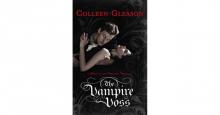 The Vampire Voss
The Vampire Voss Lavender Vows
Lavender Vows Sanctuary of Roses
Sanctuary of Roses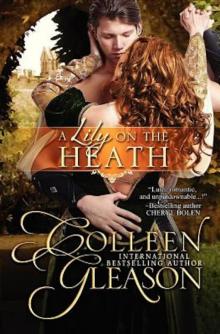 A Lily on the Heath
A Lily on the Heath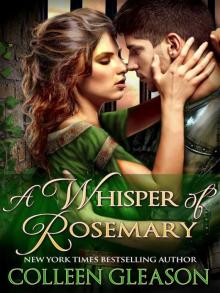 A Whisper Of Rosemary
A Whisper Of Rosemary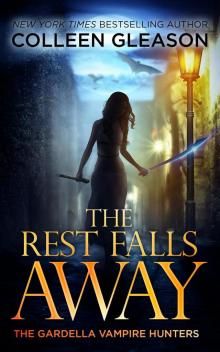 The Rest Falls Away
The Rest Falls Away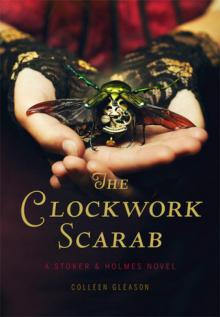 The Clockwork Scarab
The Clockwork Scarab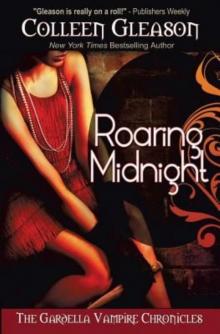 Roaring Midnight
Roaring Midnight The Vampire Dimitri
The Vampire Dimitri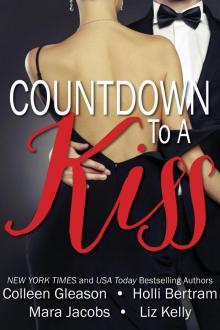 Countdown To A Kiss A New Years Eve Anthology
Countdown To A Kiss A New Years Eve Anthology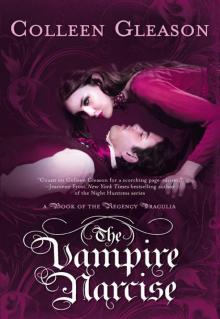 The Vampire Narcise
The Vampire Narcise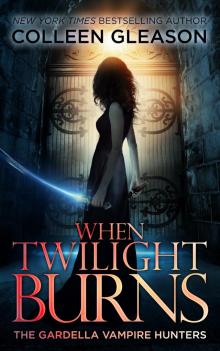 When Twilight Burns
When Twilight Burns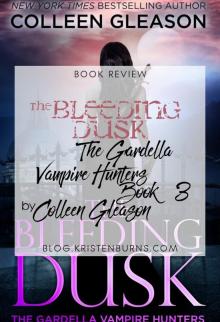 The Bleeding Dusk
The Bleeding Dusk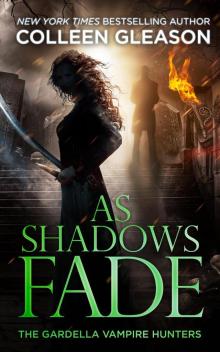 As Shadows Fade
As Shadows Fade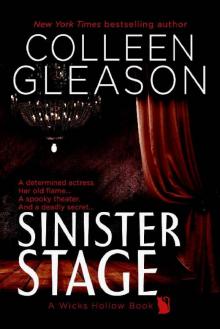 Sinister Stage: A Ghost Story Romance and Mystery (Wicks Hollow Book 5)
Sinister Stage: A Ghost Story Romance and Mystery (Wicks Hollow Book 5)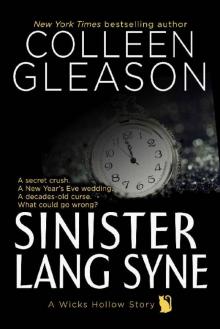 Sinister Lang Syne: A Short Holiday Novel (Wicks Hollow)
Sinister Lang Syne: A Short Holiday Novel (Wicks Hollow) Sinister Sanctuary
Sinister Sanctuary Night Beckons
Night Beckons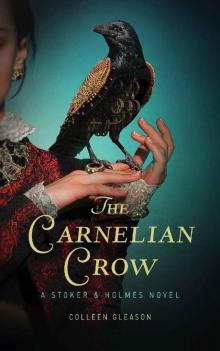 The Carnelian Crow: A Stoker & Holmes Book (Stoker and Holmes 4)
The Carnelian Crow: A Stoker & Holmes Book (Stoker and Holmes 4)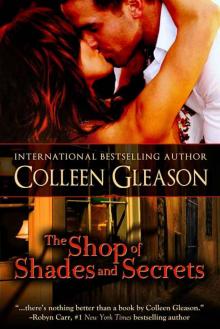 The Shop of Shades and Secrets (Modern Gothic Romance 1)
The Shop of Shades and Secrets (Modern Gothic Romance 1) Lavender Vows tmhg-1
Lavender Vows tmhg-1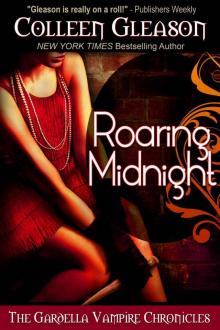 Roaring Midnight (The Gardella Vampire Chronicles | Macey #1)
Roaring Midnight (The Gardella Vampire Chronicles | Macey #1) Lavender Vows (The Medieval Herb Garden Series)
Lavender Vows (The Medieval Herb Garden Series) Dark Secrets: A Paranormal Romance Anthology
Dark Secrets: A Paranormal Romance Anthology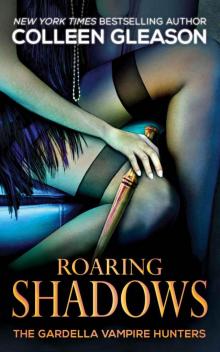 Roaring Shadows
Roaring Shadows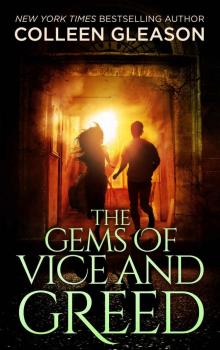 The Gems of Vice and Greed (Contemporary Gothic Romance Book 3)
The Gems of Vice and Greed (Contemporary Gothic Romance Book 3)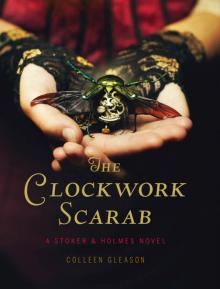 The Clockwork Scarab s&h-1
The Clockwork Scarab s&h-1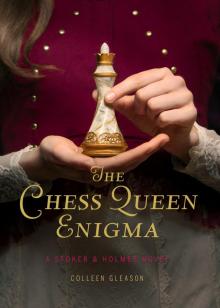 The Chess Queen Enigma
The Chess Queen Enigma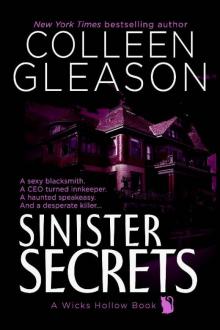 Sinister Secrets
Sinister Secrets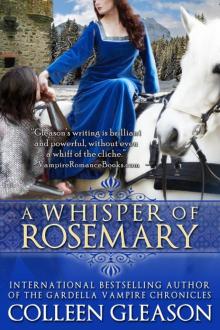 A Whisper of Rosemary (The Medieval Herb Garden Series)
A Whisper of Rosemary (The Medieval Herb Garden Series) Dark and Damaged: Eight Tortured Heroes of Paranormal Romance: Paranormal Romance Boxed Set
Dark and Damaged: Eight Tortured Heroes of Paranormal Romance: Paranormal Romance Boxed Set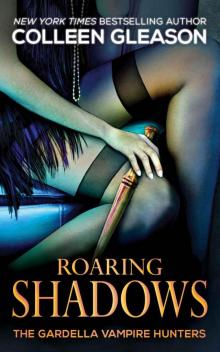 Roaring Shadows: Macey Book 2 (The Gardella Vampire Hunters 8)
Roaring Shadows: Macey Book 2 (The Gardella Vampire Hunters 8)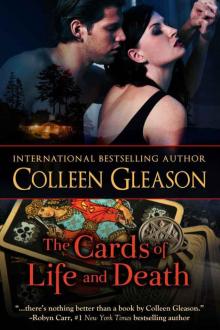 The Cards of Life and Death (Modern Gothic Romance 2)
The Cards of Life and Death (Modern Gothic Romance 2)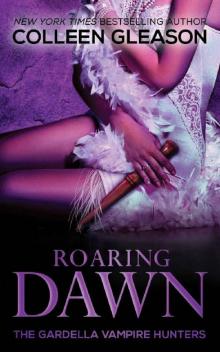 Roaring Dawn: Macey Book 3 (The Gardella Vampire Hunters 10)
Roaring Dawn: Macey Book 3 (The Gardella Vampire Hunters 10)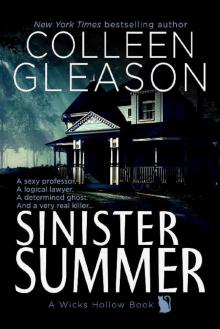 Sinister Summer
Sinister Summer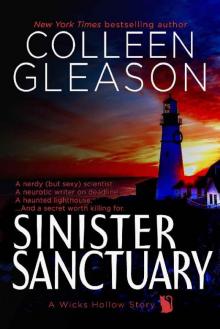 Sinister Sanctuary: A Ghost Story Romance & Mystery (Wicks Hollow Book 4)
Sinister Sanctuary: A Ghost Story Romance & Mystery (Wicks Hollow Book 4)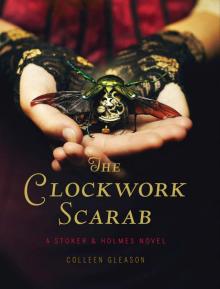 The Clockwork Scarab: A Stoker & Holmes Novel
The Clockwork Scarab: A Stoker & Holmes Novel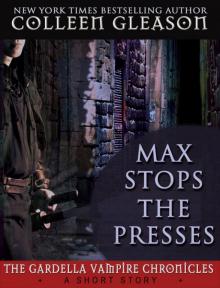 Max Stops the Presses
Max Stops the Presses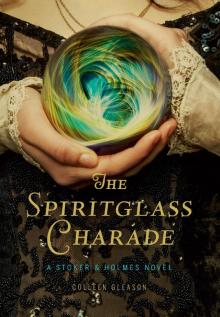 The Spiritglass Charade
The Spiritglass Charade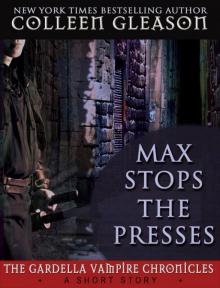 Max Stops the Presses: A Gardella Vampire Chronicles Short Story
Max Stops the Presses: A Gardella Vampire Chronicles Short Story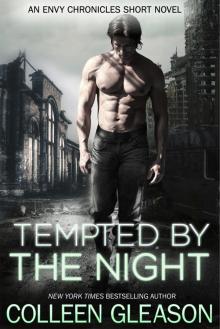 Tempted by the Night
Tempted by the Night